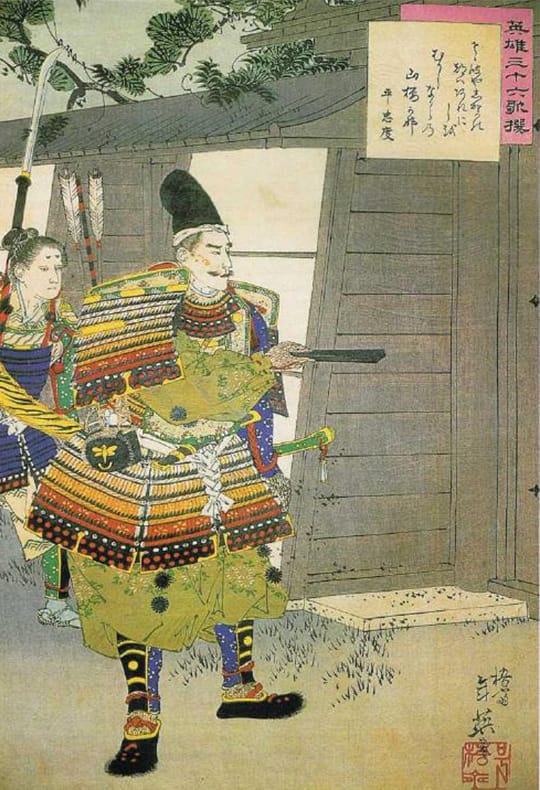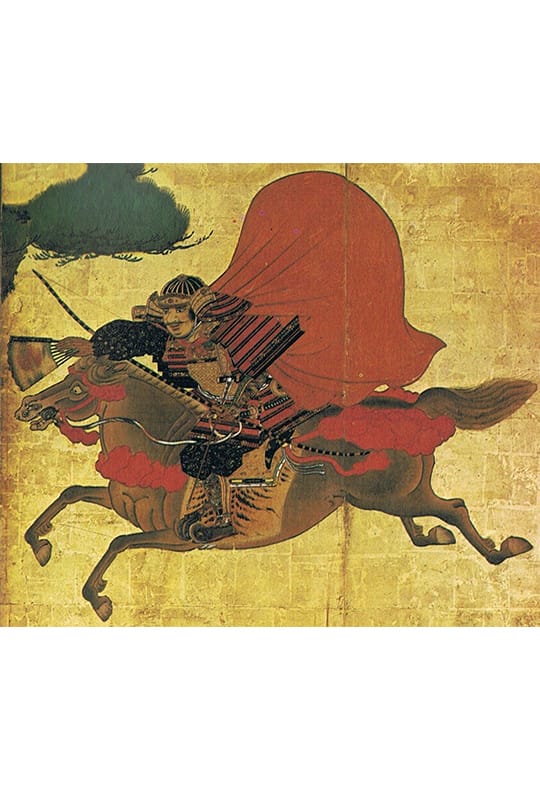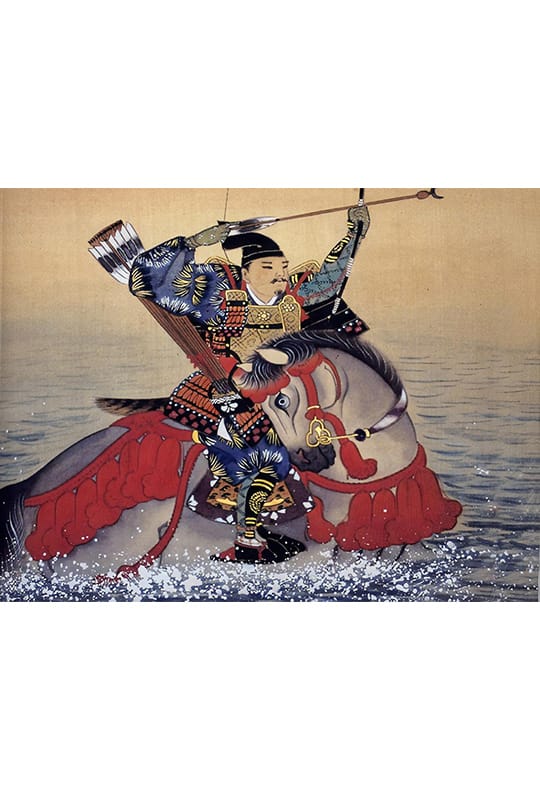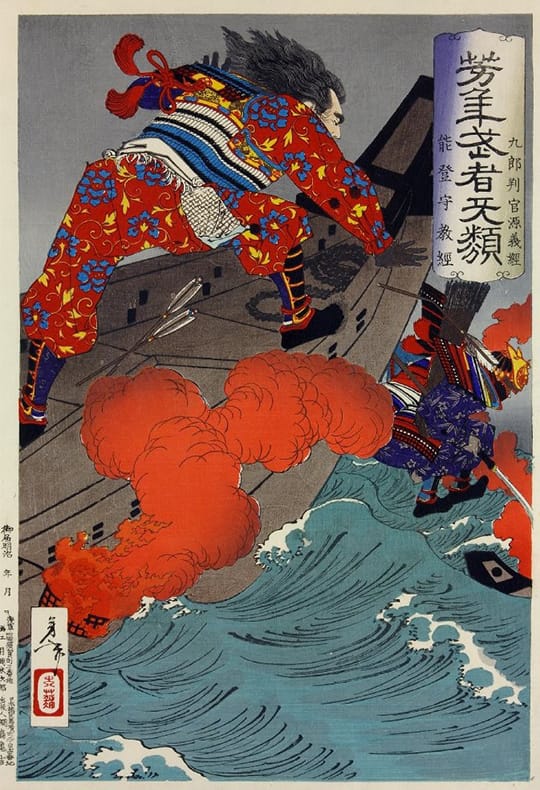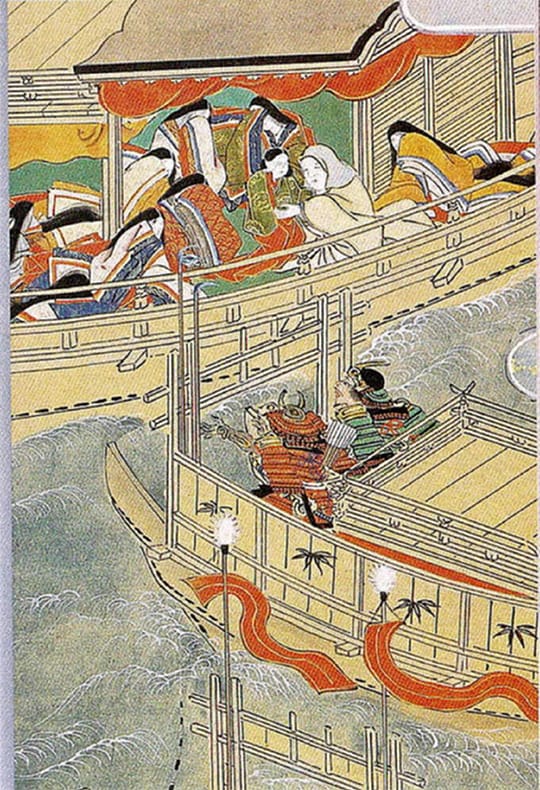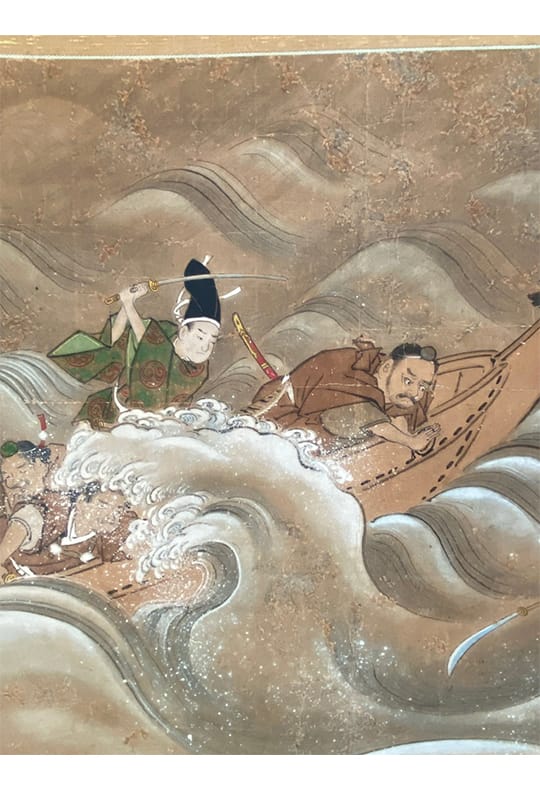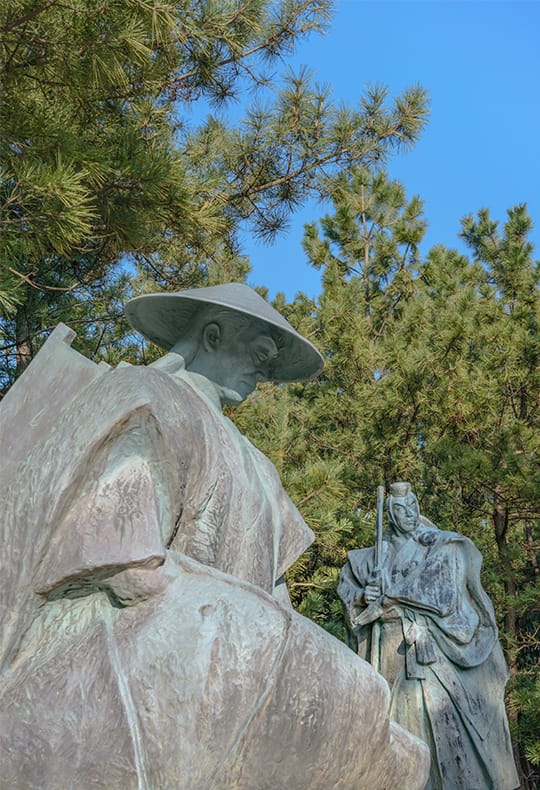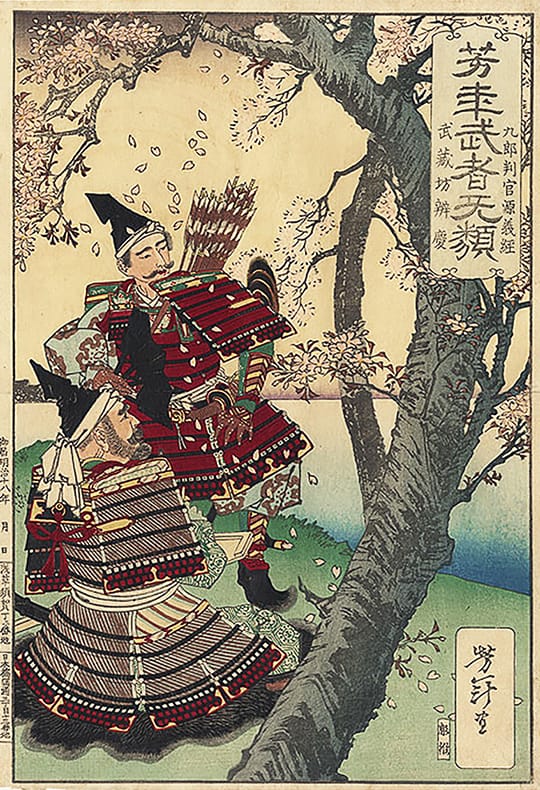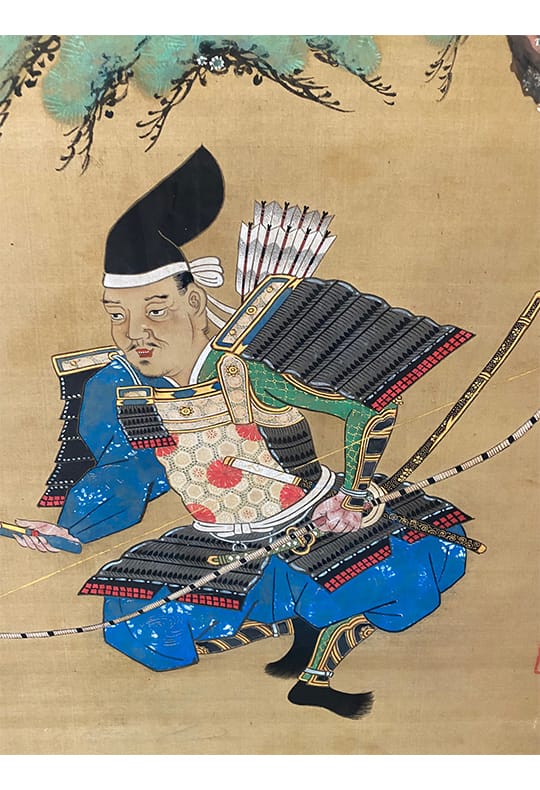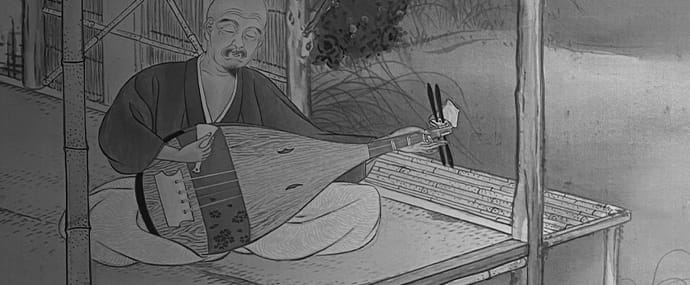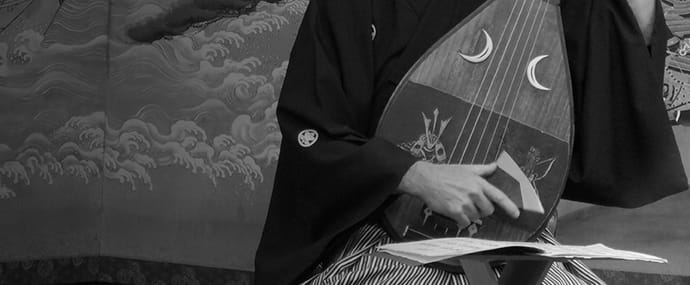The Tale of the Heike-search

yashima
屋島
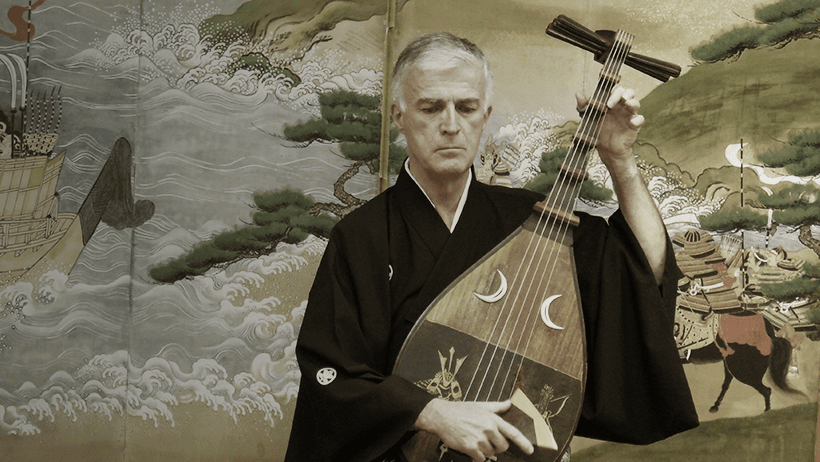
Introduction
Yashima is a condensed version of chapters 1 through 3 of the 11th book of The Tale of the Heike (HM). Other sources, such as the Genpei Seisuiki, and pieces with the same title from different music genres — Noh, kōwakamai, and jiuta — have influenced the text of this biwa-ballad. The episode of the red bulls, for example, is not found in the HM.
Differing from the HM, the focus of this ballad is on the end of the story: the death of Tsuginobu. In the three chapters of the HM, the fight between Noritsune and Yoshitsune resulting in Tuginobu’s death covers less than one tenth of the text, whereas in the biwa-ballad, the second half dwells on this moving episode. This change is unmistakably connected to the socio-historical background of the chikuzen biwa The text was written by TSUJIMURA Gyokuran in the early decades of the 20th century, a time during which Japan society was becoming increasingly militarized. It was thus imperative that these popular biwa ballads presented the loyalty of warriors and the close emotional relationships between soldiers and their leaders in a positive light. The contemporary audience was to be moved by Tsuginobu’s heroic final monologue, and brought to tears when Yoshitsune, the supreme general of the GENJI, weeps over his dying kinsman.
Synopsis
The GENJI general, Yoshitsune, vowed to the Cloistered Emperor Go-Shirakawa to prevent the return of the HEIKE clan – then in Shikoku after having been defeated by the GENJI at Ichinotani – to the capital, Kyōto.
30,000 GENJI troops first moved to present day Osaka, from which they planned to ferry across the Inland Sea to the island of Shikoku. In spite of the onset of a violent storm, which normally would have brought all travel to a stop, Yoshitsune refused to wait: he chose 150 men and set out with five ships on very rough waters at 2 a.m. It took a mere four hours to reach Shikoku, a trip, which normally was thought of as requiring three days of rowing.
Reaching Hachima (in Tokushima Prefecture) at 6 a.m., the GENJI immediately had their first encounter with the enemy; however, as the HEIKE were not yet expecting GENJI troops, they were quickly vanquished and scattered.
Yoshitsune selected one of his men, Chikaie, a local man, to provide in valuable information about the region. When the GENJI neared Yashima, Chikaie told Yoshitsune that during low tide, horses could easily cross the sea between Shikoku and Yashima. While giving this explanation, a red bull appeared and crossed the shallow waters. Yoshitsune was delighted and called this a divine sign by the warrior god, Hachiman Bosatsu.
When Yoshitsune and his men arrived at Yashima, the head of the HEIKE clan, Munemori was taken by surprise. Intending to inspect the decapitated heads taken in an earlier battle, he was not prepared to encounter the GENJI. In the confusion, he escorted members of the Imperial family to the boats in order to secure their safety. When the HEIKE announced themselves, the GENJI warrior GOTŌ Byōe Sanemoto stealthily slipped away to the temporary palace and set it afire. Munemori was extraordinarily angry when he realized that the GENJI troop was rather small and that he had fled too hastily to the boats. He then asked Noritsune to confront the enemies. After wounding many GENJI warriors shielding Yoshitsune, Noritsune lost his patience and demanded that Yoshitsune face him in combat. When Noritsune shot an arrow, Yoshitsune’s faithful retainer Tsuginobu leaped in front, and the arrow pierced his armor killing him. Kikuōmaru, Noritsune’s page, tried to take Tsuginobu’s head as a battle trophy, but was instantly killed with an arrow shot by Tsuginobu’s brother Tadanobu.
The following scene of Tadanobu embracing his brother, Tsuginobu, and bringing him to Yoshitsune, who had the head of his dying retainer placed on his knees, becomes a beautiful moment of heroic last words, replete with encouragement as he faces death, undying vows of loyalty, and the shedding of many bitter tears.

Lyrics
-
1. MINAMOTO no Yoshitsune, general of the Fifth-Rank, Der General im Fünften Hofrang, MINAMOTO no Yoshitsune,
Kebiishi goinojō MINAMOTO no Yoshitsune wa 検非違使五位の尉源義経は
-
2. led his army to Yashima in Sanuki Province führte seine Truppen in die Sanuki Provinz nach Yashima,
Sanuki no Yashima ni senkyo suru 讃岐の屋島に占拠する
-
3. to destroy the HEIKE army. um dort die HEIKE zu vernichten.
HEIzoku o senmetsu sezunba 平族を殲滅せずんば
-
4. His intention was to prevent their return to the Capital, Ihre Rückkehr in die Hauptstadt wollte er um jeden Preis verhindern,
futatabi ōjō no chi o fumazu to 再び王城の地を踏まずと
-
5. a promise he had made to the Cloistered Emperor. denn dies hatte er dem abgedankten Kaiser zugesagt.
in no gosho ni sōjō shi tatematsuri 院の御所に奏上し奉り
-
6. In the Second Month of the First Year of the Bunji-era (1185) Im ersten Jahr der Bunji-Zeit (1185) im zweiten Monat
Bunji gan’nen kisaragi nakaba 文治元年如月中旬
-
7. he led an army of 30,000 horsemen, stand er 30’000 Reitern vor,
sanman yoki o insotsu shi 三万余騎を引率し
-
8. and arrived in Fukushima in Settsu Province. als er in Fukushima, im Lande Settsu, eintraf.
Settsu no Fukushima ni kitari shi ni 摂津の福島に来りしに
-
9. A storm sudden rose and the sea howled in its fury. Doch ein Sturm brach plötzlich los mit ungestümem Wellengang.
bōfū niwakani okori kaijaku shikiri ni sakebu 暴風遽に起り海若連に号ぶ
-
10. The brave Yoshitsune made nothing of this. Yoshitsune, den kühnen Feldherrn, kümmerte dies wenig,
gōki no Yoshitsune mono tomo sezu 豪気の義経物ともせず
-
11. He had brought a mere 150 horsemen with him 150 Reiter folgten ihm,
wazuka ni hyakugojikki o shitagaete 僅に百五十騎を随へて
-
12. and crossed to Yachima Bay in Awa. als er zur Bucht von Yachima in Awa übersetzte.
Awanokuni Yachimanoura ni watarikeri 阿波国八間の浦に渡りけり
-
13. When he reached the hill overlooking the bay, Dort bestieg er einen Hügel,
urawa ni tsuzuku oka no e ni 浦曲につゞく丘の上に
-
14. he saw several red flags of the enemy. wo er ein paar Flaggen seiner Gegner sichtete.
akahata shigoryū miekereba 赤旗四五旒見えければ
-
15. “Rout the forces!” he ordered his men, “Los greift sie an!” befahl er gleich
are kechirase to geji no shita アレ蹴散らせと下知の下
-
16. and had them ride wild horses. Their flailing hooves Auf feurig flinken Pferden,deren Hufe klappernd lärmten
isami ni isamu arakoma no 勇みに勇む荒駒の
-
17. scattered SAKURAMA no Yoshitsura and his men, schlugen sie SAKURAMA no Yoshitsuras Truppen
hizume ni chirō SAKURAMA Yoshitsura 蹄にちらふ桜間良連
-
18. many of them falling with only one kick. augenblicklich in die Flucht.
tada hito ate ni ochite keri 唯一当に落ちてけり
-
19. “What an excellent beginning! We must hurry!” shouted Yoshitsune, “Welch guter Anfang, lasst uns eilen”, rief erfreut Yoshitsune.
saisaki yoshi zo isoge ya to 幸先よしぞ急げやと
-
20. and they crossed Nakayama to Hikida Bay. Sie ritten auf den Berg Nakayama und zogen weiter bis zur Bucht von Hikida.
Nakayama koete Hikidaura 中山こえて引田浦
-
21. With the harbor of Shido on their right, Den Hafen von Shido zur Rechten
Shido no minato o mete ni mite 志度の港を右手に見て
-
22. they soon arrived at Kita, kamen sie in kurzer Zeit nach Kita,
hayaku mo koko e Kitagōri はやくもここへ木田郡
-
23. surging along the beach of Mure. wo sie dann entlang dem Strand von Mure zogen.
Mure no hamabe ni oshiyosekeri 牟礼の浜辺に押寄けり
-
24. Yoshitsune finally ascended Mount Uryū Dort bestieg Yoshitsune den Berg Uryū,
yagate Yoshitsune Uryūzan ni nobori やがて義経瓜生山に登り
-
25. and gazed in the distance at Yashima. von wo er in der Ferne Yashima, die Insel sah.
Yashima no kata o nagametsutsu 屋島の方を眺めつゝ
-
26. He summoned the local warrior Chikaie Nun rief er einen Samurai der Gegend, Chikaie, zu sich,
tochi annai no bushi o maneki 土地案内の武士を招き
-
27. and questioned him about a shallow passage, an inlet, und fragte: “Gibt es eine seichte Stelle,
ya yo Chikaie kanata no irie wa やよ親家彼方の入江は
-
28. where they could cross on their horses, wo man zwar mit Pferden,
uma nite watararenan ya 馬にて渡られなんや
-
29. yet inaccessible to boats. aber nicht mit Schiffen auf die Insel übersetzen könnte?“
fune naradewa kayowaremajiki ya to 船ならでは通はれまじきやと
-
30. He voiced his thoughts with probing questions. Auf die forsch gestellte Frage
kizukawashige ni toitamō 気遣はしげに問ひ給ふ
-
31. Chikaie replied, “This is true. When the tide is low, antwortete Chikaie: ”In der Tat, bei Ebbe
san zōrō kashiko wa shio no hikitaru toki さん候かしこは潮の引きたる時
-
32. the waters will not reach the bellies of the horses. bleiben bei der Überquerung Pferdebäuche trocken.
uma no futobara mo tsukari sōrawazu 馬の太腹もつかり候はず
-
33. It is now in the early afternoon of the 19th day, Heute, am neunzehnten, früh am Nachmittag
kyō wa jūkūnichi ima wa hitsuji no koku 今日は十九日今は未の刻
-
34. and the tide is extremely low,” ist wohl der Wasserpegel ganz besonders tief.”
hishio no masakari nite sōrō to 干潮の真盛りにて候と
-
35. he replied, pointing with his fingers. Er wies mit seinem Zeigefinger in die Richtung jener Stelle –
yubisashi nagara kotaekeru 指さしながら答へける
-
36. Just at this moment, a red bull und genau in diesem Augenblick
toki shimo are ya akaushi no 時しもあれや赤牛の
-
37. attracted by something, da watete ein rotes Rind dort
nani ni kokoro o hikarete ya 何に心を引かれてや
-
38. entered the waters from the Mure beach, weg vom Strand von Mure
Mure no hama yori umi ni iri 牟礼の浜より海に入り
-
39. and began to cross in the direction of Yashima. stracks zur Insel Yashima hinüber..
Yashima o sashite watari yuku 屋島をさして渡りゆく
-
40. Yoshitsune, who saw this immediately, thundered, Yoshitsune gewahrte dies und rief begeistert
Yoshitsune mezatoku kitto mite 義経眼ざとくキッと視て
-
41. “Hachiman is guiding us! “Ist das nicht ein Wink vom Kriegsgott Hachiman!
are koso Hachiman no onmichibiki naru zo あれこそ八幡の御導なるぞ
-
42. Before the enemy is aware, Bevor die Feinde uns entdecken,
iza teki no satoranu ma ni いざ敵のさとらぬ間に
-
43. Cross! Quickly!” lasst uns schnell hinüberreiten.”
toku watare ya to daionjō 疾く渡れやと大音声
-
44. The first to cross was young TASHIRO Nobutsuna; TASHIRO Nobutsuna, ein junger Krieger, war der erste,
daiichiban ni TASHIRO no kanja Nobutsuna 第一番に田代の冠者信綱
-
45. the second to cross was GOTŌ Byōe Sanemoto, und der zweite war GOTŌ Byōe Sanemoto,
dainiban ni wa GOTŌ Byōe Sanemoto 第二番には後藤兵衛実基
-
46. who was followed by KAMADA Tōji Mitsumasa, KAMADA Tōji Mitsumasa war der nächste,
tsuzuite KAMADA Tōji Mitsumasa 続いて鎌田藤次光政
-
47. then YODO no Kōnai Tadatoshi, and the others. YODO no Kōnai Tadatoshi und viele andere folgten nach.
YODO no Kōnai Tadatoshi ra 淀の河内忠俊等
-
48. Each horseman was the match of a thousand warriors; Jeder dieser Reiter nahm’s mit tausend Feinden auf.
izure mo ikki tōsen no mosa いづれも一騎当千の猛者
-
49. they cantered their horses into the sea, Sie stürzten sich mit ihren Pferden in die Wellen,
uma o kaichū ni katte iri 馬を海中に駆って入り
-
50. and plunged across in the highest of spirits. eilten voller Tatendrang hinüber.
ikioi surudoku tosshin su 勢ひ鋭く突進す
-
51. Completely unaware of what was happening, Wer davon nichts ahnte, war
kakarubeshi tomo tsuyu shirade かゝるべしとも露知らで
-
52. the HEIKE general, Munemori, Munemori, General der HEIKE,
HEIKE no taishō Munemori wa 平家の大将宗盛は
-
53. who had won the battle of Iyo, Sieger in der Schlacht von Iyo,
Iyo no kachiikusa ni uchitoreru 伊予の勝軍に打取れる
-
54. was identifying heads taken in battle. der gerade die geschlagnen GENJI-Köpfe inspizierte.
kubijikken o nashitsutsu arishi ni 首実検を為しつゝありしに
-
55. He panicked with the sudden alert Als er hörte,
GENJI no taigun oshiyosetari to 源氏の大軍押寄せたりと
-
56. that the GENJI warriors had attacked, dass die GENJI-Krieger seine Truppen angegriffen hatten,
kakyū no chūshin ni odoroki awate 火急の注進に愕きあはて
-
57. and rushed to the temporary palace. stürmte er zum temporären Kaisersitz,
isogi Dairi ni haseitari いそぎ内裏に走せ詣り
-
58. He accompanied the former emperor and his mother, um schnell den Kaiser und die Kaisermutter
Sentei Nyoin o gushi mairase 先帝女院を具し進らせ
-
59. who he thought to be in great danger, die er in Gefahr zu kommen wähnte,
torikomerarete wa ichidaiji to 取籠められては一大事と
-
60. and encouraging his men, they boarded the boats, zu den Schiffen zu geleiten,
mikata o unagashi fune ni nori 味方を促し船に乗り
-
61. and rowed out to the open sea. wo er sie auf offner See in Sicherheit zu bringen hoffte.
oki no kata e to kogiidekeri 沖の方へと漕ぎ出でけり
-
62. At this very moment, the GENJI forces arrived, Doch nun rasten GENJI-Krieger im Galopp
orishimo koko e GENJI no gunzei 折しも此所へ源氏の軍勢
-
63. in a headlong rush schnurstracks in seine Nähe,
masshigura ni hasekitari 驀然に馳せ来り
-
64. and lined their horses at the water’s edge. stellten sich in einer Reihe auf am Ufer.
uma o nagisa ni tateyosete 馬を渚に立て寄せて
-
65. First, Yoshitsune and then all his generals Yoshitsune war der erste, und nach ihm
Yoshitsune hajime shōshi no menmen 義経始め将士の面々
-
66. one after the other, announced themselves. tat einer nach dem andern Namen, Rang und Herkunft kund.
shidai ni nanori o agetarikeri 逐次に名乗を揚げたりけり
-
67. Meanwhile, GOTŌ Byōe Sanemoto Derweilen aber stahl sich GOTŌ Byōe Sanemoto
konotoki GOTŌ Byōe Sanemoto wa 此時後藤兵衛実基は
-
68. dashed away unnoticed, weg und ging ganz unbemerkt
satto sonoba o hasenukete サッと其場を馳せ抜けて
-
69. entered the temporary palace and set it afire. zum temporären Kaisersitz.
Dairi ni irite hi o hanateba 内裏に入りて火を放てば
-
70. A dense black smoke covered the ground, Er steckte ihn in Brand. Viel schwarzer Rauch verbreitete sich schleichend,
mōmōtaru kokuen chi o ōi 朦々たる黒炎地を掩ひ
-
71. and the sky burned red with flames. und der Himmel glühte rot im Flammenmeer.
en’entaru kōen ten o kogashi 炎々たる紅炎天を焦し
-
72. Within minutes, the temporary palace Es dauerte nicht lange, bis der Kaisersitz
sashimo no Dairi mo toki no ma ni さしもの内裏も瞬の間に
-
73. was little more than ashes. in Schutt und Asche fiel.
aware hai to zo nari ni keru あはれ灰燼とぞなりにける
-
74. Munemori looked at the GENJI force Munemori schaute sich die GENJI Truppe an
Munemori GENJI no gun o uchinagame 宗盛源氏の軍を打眺め
-
75. and realized that it was smaller than he had thought. und stellte fest, dass sie viel kleiner war, als er zuerst befürchtet hatte.
teki wa omoishi yori mo kozei nari 敵は想ひしよりも小勢なり
-
76. “Noritsune, where are you? “Herr von Noto, Noritsune, seid Ihr da?
Notodono wa owasazu ya 能登殿は在さずや
-
77. Go to the shore and face the GENJI.” So geht zum Ufer hin und greift die GENJI an!“, befahl er.
kuga ni chikazuki issen shi tamae to 陸に近づき一戦し給へと
-
78. When given these orders, Noritsune, without hesitation, Noritsune zögerte nicht einen Augenblick,
iwarete Noritsune yūyo mo naku いはれて教経猶予もなく
-
79. obeyed and immediately stood, „Verstanden!” rief er unverzüglich und stand auf.
uketamawarinu to tsuttatchi agari 承りぬと突立ち上り
-
80. leading two hundred men, Er hatte unter sich 200 Reiter,
nihyakuyonin o hikitsurete 二百余人を率連れて
-
81. and rowed to the water’s edge before the main gate, die mit ihm bis vor das Haupttor ruderten.
sōmon mae no migiwa ni kogiyose 総門前の汀に漕寄せ
-
82. where he and all his men shot their arrows. Von dort aus schossen sie in schneller Folge Pfeil auf Pfeil.
mina issei ni ya o hanatsu 皆一斉に矢を放つ
-
83. The GENJI responded in turn and shot also arrows, Die GENJI Schützen reagierten schnell
GENJI mo ōjite ya o hanachi 源氏も応じて矢を放ち
-
84. their accompanying cries ringing to the heavens. und brüllten, dass der Himmel dröhnte.
yasakebi tenchi ni hibiki tari 矢叫び天地に響きたり
-
85. Noritsune finally stepped to the fore, Nun trat Noritsune vor die eignen Männer,
yagate Noritsune jintō ni ide やがて教経陣頭に出で
-
86. and when he took aim, with Yoshitsune in his sights, zielte ganz entschieden auf Yoshitsune.
Yoshitsune mezashite iran to su 義経目指して射らんとす
-
87. the GENJI officers noticed, Die GENJI Offiziere merkten dies jedoch sogleich
GENJI no shōshi kaku to mite 源氏の将士かくと見て
-
88. drove their horses close to Yoshitsune und eilten schnell hinüber zu Yoshitsune,
uma no kashira o tatenarabe 馬のかしらを立て竝べ
-
89. and placed themselves in a line before their lord. um sich dort als Schutz in einer Reihe vor ihn hinzustellen.
kimi no bazen ni tachifusagaru 君の馬前に立ちふさがる
-
90. Noritsune raised his voice in anger, Dies erregte Noritsunes Zorn gewaltig.
Noritsune koe o araragete 教経声をあらゝげて
-
91. “Out of my way, you useless underlings!” “Weg mit euch, ihr mieses Pack!”
soko nokazuya zōnin bara to そこのかずや雑人輩と
-
92. he said, and with his heavy bow, Er spannte seinen Riesenbogen,
kanete kikoyuru gōkyū nite かねて聞ゆる強弓にて
-
93. in short succession, he made several shots, und ließ einen Pfeil dem andern folgen.
yatsugibaya ni ikakereba 矢継早に射かければ
-
94. which struck three or four of the GENJI men. Drei, vier GENJI Krieger
GENJI no yūshi san yo nin 源氏の勇士三四人
-
95. Sustaining serious injuries, they retired, wurden schwer verwundet, scherten aus und zogen sich zurück.
itade o oite hikishirizoku 痛手を負ひて引退く
-
96. but one last arrow, with aim sure and true Ein letzter Pfeil war aber ohne Zweifel
sono ki ni jōji mata mo isshi その機に乗じ復も一矢
-
97. should have hit Yoshitsune fatally. für Yoshitsune bestimmt und hätte ihn getroffen,
awaya Yoshitsune ni meichū sen to su あはや義経に命中せんとす
-
98. But SATŌ Tsuginobu, a close retainer, leapt high in the air, wenn nicht SATŌ Tsuginobu blitzschnell
SATŌ Tsuginobu yokoai yori 佐藤継信横合より
-
99. and instantly, the arrow entered his left shoulder in die Luft gesprungen wäre,
mi o odorashite tachiōeba 身を躍らして立ち掩へば
-
100. passing completely through his body, um den Pfeil mit seinem Körper abzufangen.
tachimachi yunde no kata yori mete no waki e 忽ち左手の肩より右手の脇へ
-
101. exiting from his right armpit. Er durchdrang ihn von der linken Schulter bis zur rechten Achselhöhle.
zukari to bakari tsuranukare ズカリとばかり貫かれ
-
102. He tumbled him from his horse. Tsuginobu stürzte gleich vom Pferd.
massakasama ni uma yori otsu 真逆様に馬より落つ
-
103. Seeing this, Noritsune’s page, Kikuōmaru, Noritsune’s Page , Kikuōmaru, bemerkte dies
Noritsune no warabe Kikuōmaru 教経の僮菊王丸
-
104. jumped lightly from the ship und sprang vom Schiff hinüber
fune yori hirari to tonde ori 船よりひらりと飛んで下り
-
105. to claim Tsuginobu’s head. um den Kopf von Tsuginobu sich zu holen.
Tsuginobu no kubi o kakan to suru o 継信の首を掻んとするを
-
106. Tsuginobu’s younger brother, Tadanobu, Tsuginobus Bruder, Tadanobu,
Tsuginobu no otōto Tadanobu 継信の弟忠信
-
107. seeing this from afar slew him with an arrow. sah dies, schoss sogleich von weitem einen Todespfeil..
haruka ni mitome ite taosu 遥に認め射て倒す
-
108. Even the steadfast Noritsune Wohl war Noritsune ein bärenstarker Krieger,
sasuga gōmai no Noritsune mo さすが豪邁の教経も
-
109. was saddened to see Kikuōmaru’s death. doch die Trauer um den toten Pagen übermannte ihn vollkommen;
Kikuōmaru no senshi o awaremi 菊王丸の戦死を憐み
-
110. His will to fight vanished er verlor die Lust zu kämpfen,
ima wa tatakō yoyū mo use 今は戦ふ余勇も失せ
-
111. and in his grief, he withdrew from the battle fields. zog sich schmerz- und leid-geplagt zurück.
shūzen to shite hikiagekeri 愁然として引揚げけり
-
112. In the meantime, Tadanobu Derweil ging Tadanobu zu Tsuginobu,
saru hodo ni SATŌ Tadanobu wa さる程に佐藤忠信は
-
113. embraced his elder brother, Tsuginobu, nahm ihn in die Arme
ani Tsuginobu o kakiidaki 兄継信を掻き抱き
-
114. and knelt before Yoshitsune. kniete hin vor seinen Herrn und legte seinen Bruder ihm zu Füßen.
kimi no gozen ni hizamazukeba 君の御前に跪けば
-
115. Yoshitsune leapt from his horse Yoshitsune sprang vom Pferd und bettete
Yoshitsune uma yori tobiorite 義経馬より飛び下りて
-
116. and placed Tsuginobu’s head in his lap. den Kopf von Tsuginobu in den Schoß.
Tsuginobu no kashira o hiza ni nose 継信の頭を膝に載せ
-
117. “A brave warrior like you, “Ein Held wie du,
ikani Saburō nanji no gotoki gōnomono no いかに三郎汝の如き剛の者の
-
118. being hit by merely one arrow, getroffen von nur einem Pfeil,
yakizu hitotsu ni kaku made ni 矢疵一つにかくまでに
-
119. cannot succumb to such a trivial thing,” kann deshalb doch nicht sterben”,
nayami otorouru koto ya aru to 悩み衰ふる事やあると
-
120. he said, trying to encourage him. sprach er, um ihm Mut zu machen.
hagemasubeku mo ōsekereba 励ますべくも仰せければ
-
121. Tsuginobu struggled to raise his head and said: Tsuginobu hob mit letzter Kraft nun seinen Kopf:
Tsuginobu wazuka ni kashira o age 継信僅かに頭をあげ
-
122. “Since the time I left home, “Seit ich aus meiner Heimat wegzog,
furusato o izuru sono toki yori 故郷を出る其時より
-
123. my life has been devoted to your service. war ich stets bei Euch im Dienst.
ichimei wa kimi ni sasage tatematsurinu 一命は君に捧げ奉りぬ
-
124. Now I am dying in your stead, An Eurer Stelle nun zu sterben,
ima on’inochi ni kawari shisen koto 今御命に代り死せんこと
-
125. something that has always been my deepest wish. war für immer mir ein Herzenswunsch.
higoro no honmō nite sōrae 日頃の本望にて候へ
-
126. But my lord’s destruction of the HEIKE Dass Ihr jedoch, mein Herr, die HEIKE ganz besiegt
tada kimi no HEIKE o uchihoroboshi たゞ君の平家を討滅し
-
127. and the establishment of his reign something I shall never see. und im Land die Führung übernehmt, kann ich nicht mehr erleben.
miyo ni tatase tamō o minu koso 御代に立たせ給ふを見ぬこそ
-
128. This I regret deeply.” Das bedaure ich unendlich”,
nokori oshū sōrae to 残り惜う候へと
-
129. As his tears began to fall, sagte er und weinte.
yōyaku katarite rakurui sureba 漸く語りて落涙すれば
-
130. Yoshitsune was choked with tears. Yoshitsune schluckte seine Tränen,
Yoshitsune mo namida ni musebi tamaishi ga 義経も涙に咽び給ひしが
-
131. After a brief moment, he faced Tsuginobu: wandte sich nach einer Weile nochmals Tsuginobu zu.
yaya arite Tsuginobu ni uchimukai やゝありて継信に打対ひ
-
132. “The time for the end of the HEIKE by our hands “Die HEIKE völlig zu besiegen,
warera no HEIKE o horobosan koto 吾等の平家を滅さん事
-
133. will take less than ten days. wird nicht länger dauern als ein Dutzend Tage.
junjitsu no uchi ni sugizarubeshi 旬日の中に過ぎざるべし
-
134. When our time was to come, Wenn die Zeit gekommen ist,
ware yo ni araba nanji kyōdai o 我世に在らば汝兄弟を
-
135. I thought you two brothers would be honoured with distinctions. wollte ich euch beide – Tsuginobu, Tadanobu – ehren und belohnen.
sayū ni taten to omoishi ni 左右に立てんと思ひしに
-
136. To see you take eternal leave of me Dass du aber jetzt für immer scheidest,
ima nanji ni nagaku wakaruru wa 今汝に永く別るゝは
-
137. and never to return is unbearable”. ist für mich unsäglich traurig.”
kaesugaesu mo munen ya to 返す返すも無念やと
-
138. Tsuginobu must have heard these words Tsuginobu mochte diese Worte wohl vernommen haben,
notamō koe no kikoete ya のたまふ声の聞えてや
-
139. as nodding in joy denn er nickte freudig,
Tsuginobu ureshige ni unazukitsu 継信嬉しげに首肯きつ
-
140. he took his last breath. tat danach jedoch den letzten Atemzug.
sonomama iki wa taenikeri 其儘呼吸は絶にけり
-
141. Yoshitsune suffered terribly. Yoshitsune war tief betrübt.
Yoshitsune tsūtō aisekishi 義経痛悼哀惜し
-
142. He placed a golden studded saddle Er legte einen goldnen Sattel
ono ga aiba no Tayūguro ni 己が愛馬の太夫黒に
-
143. on his beloved black horse, Tayūguro auf Tayūguro, sein Lieblingspferd
kinpukurin no kura o oki 金覆輪の鞍をおき
-
144. and, for the repose of Tsuginobu’s soul, und übergab dies einem Mönch,
Tsuginobu no meifuku no tame 継信の冥福のため
-
145. he presented it to a monk for memorial services. damit er angemessen für das Seelenheil von Tsuginobu bete.
sō ni okurite nengoro ni tomurawasekereba 僧に贈りて懇に葬はせければ
-
146. Tadanobu and other generals, too, Tadanobu und die andern Generäle
Tadanobu hajime namiiru shōsotsu 忠信始め並居る将卒
-
147. were all deeply moved by his gesture. waren tief gerührt von dieser Geste.
izure mo fukaku kangeki shi いづれも深く感激し
-
148. “Ah, the sacrifice of life for one’s lord “Ah, sein Leben für den Herrn zu opfern,
aa kono kimi no ontame ni wa 嗚呼此君の御為には
-
149. is truly not a regrettable loss.” Ist doch wahrlich alles andere als bedauernswert” –
ichimei nanika oshikarubeki to 一命何か惜かるべきと
-
150. And the other generals all fervently vowed to follow his example. die Ritter schworen, dass für sie Tsuginobu ein Vorbild sei.
hitasura kokoro ni chikaikeru 只管心に誓ひける
-
151. The tale of these faithful retainers Das Loblied auf die treuen Männer
kakaru meishō chūshin no かゝる名将忠臣の
-
152. and the battles they fought has been told over the centuries. und die Schlachten, die sie fochten, wird für alle Ewigkeit
ikusagatari wa ikuchiyo mo 合戦語りは幾千代も
-
153. It will be sung to the evening breezes in the pines of Furutakamatsu. im Kiefernrauschen von Furutakamatsu schwingen,
furu Takamatsu no yūkaze ni ふる高松の夕風に
-
154. These songs which teach the people of the later ages, um den Menschen stets und überall
tsutaete nochi no kunitami no 伝えて後の国民の
-
155. and one with the whine of arrows, mit dem Zischen jener Pfeile,
oshiegusa tomo narikabura をしへ草ともなりかぶら
-
156. echo throughout the heavens, ja mit deren Sirren in dem weiten Himmel
hibiki wa sora ni kikoetsutsu 響は天に聞えつゝ
-
157. and forever remain in Yashima Bay, Kunde bringen von den Taten in der Bucht in Yashima,
Yashima no ura ni nokoruran 矢島の浦にのこるらん
-
158. And forever remain in Yashima Bay, Kunde bringen von den Taten in der Bucht Yashima.
Yashima no ura ni nokoruran 屋島の浦に残るらん
Notes
1,1. Fifth-Rank…Yoshitsune had been promoted to the fifth court rank, his official title being “Captain of the Police Commissioners Division” (Kitagawa 1975) or “Lieutenant in the Imperial Police” (McCullough 1999). 1, 2. MINAMOTO no Yoshitsune…Yoshitsune was the younger half-brother of MINAMOTO no Yoritomo, the political head of the GENJI, or MINAMOTO, clan. Yoshitsune was the GENJI clan’s highest-ranking general and led the main battles against the HEIKE. 2,1. Sanuki… Present-day Kagawa Province on the island of Shikoku. 2,2. Yashima…In the Middle Ages, Yashima was an island just off Takamatsu city; however, today it is a peninsula. 6. The Second Month of the First Year of the Bunji-era… The battle took place in early April 1185, the 18th day of the second month on the lunar calendar. 8,1. Fukushima…Fukushima is now the Fukushima Ward of Osaka City. According to other sources, the GENJI troupes were stationed at Naniwa Ward (Watanabe) and Amagasaki City (Kanzaki) 8,2. Settsu Province…Settsu corresponds to the present-day area between northern Osaka Prefecture and southern Hyōgo Prefecture. 12,1. Yachima…Hachima is now located in present-day Tokushima city. 12,2. Awa… Present-day Tokushima Prefecture. 14. red flags…The flags of the HEIKE army were red and those of the GENJI white. 17. SAKURAMA no Yoshitsura… The name of this HEIKE warrior is rendered in different ways depending on the source. 20. Hikida Bay…Hikida Bay, also known as Hiketa Bay, is in the eastern part of Kagawa Prefecture. 21. Shido…Shido is now known as Sanuki city Shido. 22. Kita district…Kita district is now Kitagun in Kagawa Prefecture. 23. Mure…Mure is now part of Takamatsu city, west of Shido. 24. Mt. Uryū…A hill in the city of Takamatsu, which provides a clear view of Yashima. 27. Chikaie…The full name of this warrior is KONDŌ Roku Chikaie; he provided Yoshitsune detailed information about the region. 41. Hachiman…Hachiman Bosatsu is the Warrior God of the GENJI. 44. Nobutsuna…He was a young warrior from Tashiro in Izu no kuni, now part of Shizuoka Prefecture. According to all versions of the HM, he was the first in line to attack the HEIKE at Yashima. 45. GOTŌ Byōe SANEMOTO…He was an elderly warrior who had also fought in the Hōgen (1156) and the Heiji (1159) wars. It is said that he set fire to the Emperor’s temporary palace (dairi) in Yashima. 46. KAMADA Tōji Mitsumasa… Mitsumasa was a retainer of Yoshitsune who is not mentioned in the HM; according to the Genpei Seisuiki, however, he died in the battle of Yashima. 47. YODO no Kōnai Tadatoshi…He was from Yamashiro no kuni, located in the southern part of present-day Kyōto Prefecture, and was Yoshitsune’s boatman. 52. Munemori …Munemori was the second son of Kiyomori, the head of the HEIKE clan. With the death of his father, Munemori succeeded his position as clan head. 54. Identifying heads…It was common to behead enemies and then present the head in order to maintain a record of the slain foes. 58. The former Emperor and his mother…Emperor Antoku (1178-85), was at that time 7 years old. Emperor Antoku’s mother was Kenreimon’in Tokiko. 76. Noritsune…Noritsune of the HEIKE was the lord of Noto (Ishikawa Prefecture). His father was Norimori, the younger brother of Kiyomori. 98. SATŌ Tsuginobu… He was a close retainer of Yoshitsune from Hiraizumi (Iwate Prefecture). 103. Kikuōmaru… At the time, the page, Kikuōmaru, was 18 years old. Pages were often much younger, even prepubescent boys serving in this role. 143. Tayūguro…Yoshitsune loved this horse, which had been presented to him on his promotion to the Fifth Rank in the Police-Guard. 142. a golden-studded saddle… The elevated front part of the saddle was covered with gold. 153. Furutakamatsu…Furutakamatsu is located in the present city of Takamatsu. There is a pun imbedded in this place name. “The evening breezes in the pines” is a classic poetic metaphor for music approaching nature in its beauty. Furu takamatsu has also the meaning of “venerable, tall pines”. This song is thus thought to be such an esteemed tale of loyalty and human passion that it is as beautiful as the sounds created by the gentle wind in the branches of old pines. Moreover, furu (old) implies here that this song has been and will be sung forever.

Music Notes
This ballad is rarely performed for a very sober reason. The school’s founder, TACHIBANA Kyokusō, conceived the piece, but he did not write the lyrics of this score; he only added the music-relevant elements (the pitch-numeral at the head of each line, graphic melody-formulas [or fushi] and other indications for the biwa). These are clearly his, but the lyrics were written by a calligrapher and convey a distinctly different image.
TACHIBANA Kyokusō’s calligraphy can be seen throughout the repertoire: all biwa players are familiar with it. The problem here, however, is not only due to the unfamiliar brush style of the characters, but the calligrapher has also occasionally used variants for the syllabary that are no longer used. Only advanced players already familiar with the style and interludes of chikuzen biwa are willing to accept these challenges when undertaking the piece.
In addition, the ballad is very long with 158 lines, and also extremely demanding due to the extensive dramatic episodes. Once a performer has mastered the piece, however, they discover the delight of the monumental work and the colorful variety it provides.
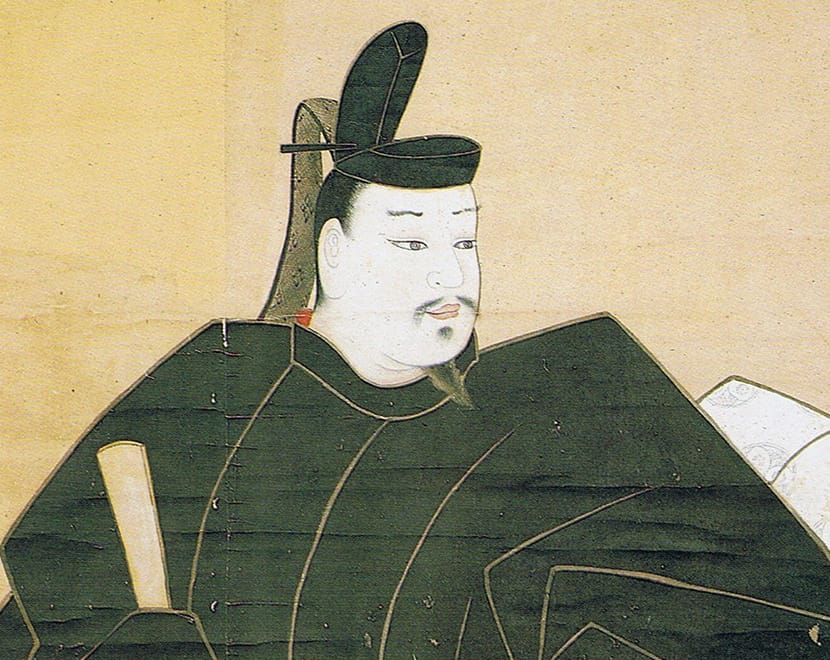
The drama of the warfare begins early in the piece, as the narration of the first enemy contact between Yoshitsune and a group of HEIKE warriors begins on line 14. A standard musical setting of a fight would normally be expected here, but the short scene surprises the listener with two nagashi (arioso parts) in quick succession. Seemingly, the composer has attempted to create a musical setting that praises the samurai spirit rather than accentuate the excitement of battle. This traditionally positive portrayal of the Japanese warrior and his spirit sets the tone for the entire narration of Yashima despite the presence of several horrifying incidents.
This short arioso-episode of a skirmish early in the piece is followed by more typical combat scenes with numerous exciting and climactic interludes up to line 107. After this, most other shorter biwa-ballads are marked by a shift that begins to prepare the listener for the conclusion of the work. In Yashima, however, a sad and intimate scene of 50 lines unfolds between Yoshitsune and Tsuginobu. The latter bravely sacrificed himself for his master by deliberately jumping in front of an arrow intended for Yoshitsune that fatally injured him. The final exchange between these two comrades in arms — leader and kinsman — is textually and musically extraordinarily sensitive and moving.
The last fifteen lines calmly express a deep admiration for these men who are selflessly committed to what they find important in life.
